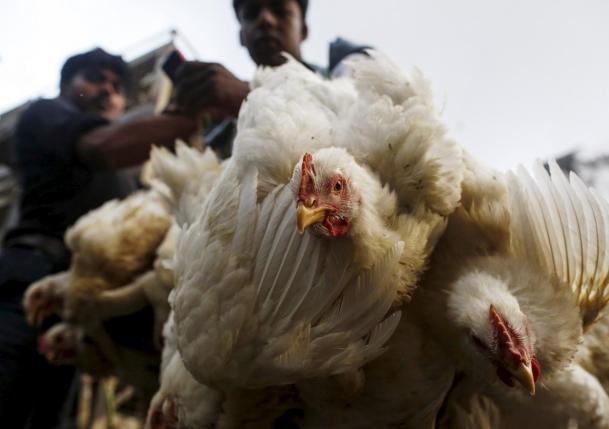During Paryushan, a holy period for the Jain community in India, Jains are seen going to temples barefoot, praying, and fasting and essentially practicing the main teaching of Jainism – ahimsa or non-violence – the same principle of peace that a Jainism-influenced Gandhi used in the fight for India’s freedom. But this year, Jains had to take to the road during festival time to protest against the politicization of the meat sale ban issue.
Every year, since 1964, slaughter houses are shut for two days during Paryushan. This year, the BJP-ruled Mira-Bhayander district in Mumbai proposed an eight-day ban which got passed. This decision was implemented by Mumbai city too, which sparked wide protests. MNS and Shiv Sena activists set up temporary stalls that sold meat. Protestors held fluttering hens by their legs while shouting slogans to continue selling meat during the ban.
MNS leader Raj Thackeray had vehemently opposed the ban, adding that Jains were a larger part of Hindus and unlike Muslims who have Pakistan; Jains had nowhere else to go. Such apparently threatening statements escalated the controversy.
Viyaykant Kothari, chariman of Mahavir Pratishthan, a Jain social work trust, said, “The original ban of 2 days was fine. Political stunts have led to this controversy. Carrying out protests with garlands of meat in front of temples is pure mockery and utterly disrespectful.”
Jains in the Mira-Bhayander locality held peaceful protests and chanted songs and sacred mantras in protest against the stalls of meat set up in front of temples and the politicised dialogue on the issue.
Raj Thackeray had said that Jains were trying to impose the vegetarian code on the entire society by imposing such restrictions. Kothari pointed out that “Jains never asked others to stop eating meat but called for non-violence for two days through the closure of slaughter houses.”
Lately, bans seem to be a trend in India. From the ban on the Nirbhaya gang rape film ‘India’s daughter’ to that on pornographic websites, bans seem to be showing a sentiment of intolerance. More importantly, issues related to food like the beef ban in Maharashtra have proved to sow discord in the society.
Bans are essentially in place to respect different religions in a diverse country like India. But if they amount to communalism, should they continue in the name of religion? BJP corporator Manisha Chorbele says, “Bans help communities to co-exist and respect each other’s customs. But even bans have limits and there is no point in extending them.”
